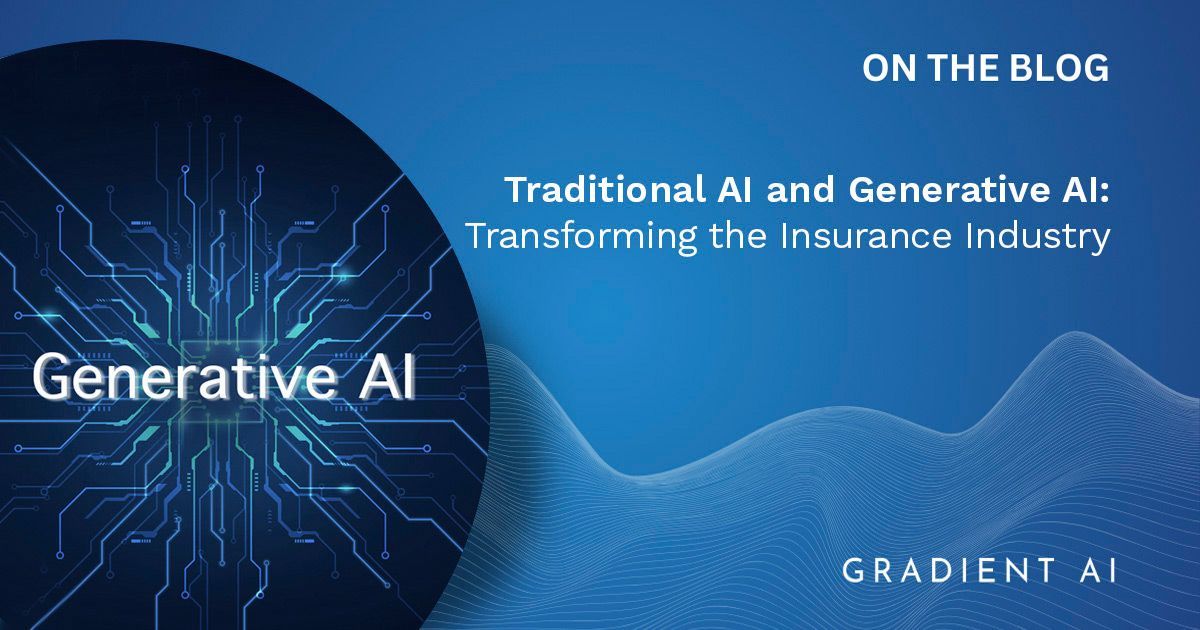Traditional AI and Generative AI: Transforming the Insurance Industry
Fueled by the power of artificial intelligence that now includes generative AI combined with traditional machine learning, the insurance industry is undergoing a profound shift. This shift goes beyond basic AI functionalities, diving deep into the realm of intelligent guided decision-making.
As more applications leverage traditional and generative AI, these technologies will turbocharge their impact on society and business. The idea of computers mimicking human reasoning and thinking used to seem distant, but today we’re witnessing it become a reality. And this is just the start for AI, akin to the early 1980s when personal computers were first being adopted. Even more transformative and profound changes are ahead.
The Benefits of Generative AI in the Insurance Industry
In the insurance industry, not only can insurers underwrite risk more accurately, provide better customer service, and automate tasks, but with the help of generative AI, they can virtually have a conversation with their organizations’ vast, previously inaccessible knowledge bases. They can now consult decades of accumulated claims data, medical notes, and outcomes to improve decision-making in underwriting and claims management.
Consider an insurer with 20, 30, or 40 years of accumulated claims data having detailed medical and adjuster’s notes, claim outcomes and associated costs. Leveraging traditional and generative AI applications, adjusters can engage with the institution’s entire knowledge base, allowing them to better understand the direction a claim might take and to determine the next best actions to drive better outcomes. Likewise, this combination empowers underwriters to make more informed decisions, assessing the predicted risk of writing a specific policy, and gaining deeper insight into the specific factors driving that risk up or down.
Industry Data Lakes Are Key to AI in Insurance
The effectiveness of AI in insurance hinges on access to extensive, high-quality data. In general, the more data an AI model is exposed to, the more accurate and effective it becomes. Industry data lakes, or databases, enriched with diverse data sets, are crucial for training such models.
Gradient AI maintains an industry data lake with tens of millions of policies and claims observations, enriched with third-party features including economic, health, geographic, and demographic data. Both generative AI large language models and traditional AI machine learning models benefit, gaining extensive knowledge that improves their effectiveness across numerous claims and policies.
AI in Insurance Delivers Real Results
Insurers that embrace these technologies today are poised to gain significant competitive advantages in the years to come. In underwriting, AI has had a demonstrative impact on key operating metrics and profitability. For example, an insurer leveraging AI:
- decreased its loss ratio by 13%
- reduced quote turnaround times by 80%, and
- increased direct written premium per employee by 86%.
On the claims side, one of Gradient AI’s customers reduced workers’ compensation claims costs by about 10%, which translated to more than $300 million in savings for the insurer’s clients.
The AI transformation in insurance represents a fundamental operational shift, moving into an era that goes beyond automation to one where decisions are profoundly informed. As insurers continue to leverage AI’s cognitive advances, the future holds the promise of an industry that operates with unprecedented intelligence, effectiveness, and efficiency, benefiting both insurers and customers alike.
Learn More Today
Read more about generative AI in insurance in this Focus Outlook article, written by Gradient’s CMO, Paul Cataldo.
To learn more about applications for traditional and generative AI in insurance,
schedule a 30-minute conversation with us today.
About Gradient AI
Gradient AI is a leading provider of proven artificial intelligence solutions for the insurance industry. Our solutions improve loss ratios and profitability by predicting underwriting and claims risks with greater accuracy, as well as reducing quote turnaround times and claim expenses through intelligent automation.
©2024 Gradient AI All rights reserved | Terms of Use | Privacy Policy | Legal Terms


